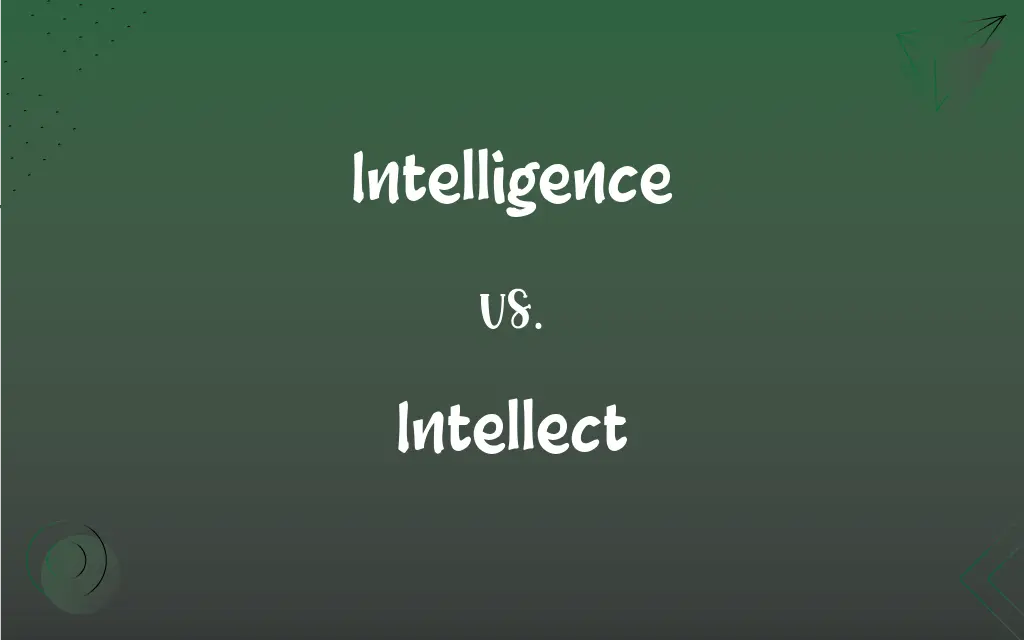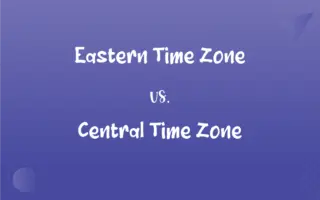Intelligence vs. Intellect: What's the Difference?
Edited by Janet White || By Harlon Moss || Published on November 22, 2023
Intelligence refers to the ability to acquire and apply knowledge and skills, while intellect is the faculty of reasoning and understanding objectively.

Key Differences
Intelligence encompasses the ability to learn, understand, and apply information, solve problems, and adapt to new situations. Intellect is the capacity for thinking and understanding in a logical, rational way.
Intelligence is often measured through IQ tests and can include various types, such as emotional and social intelligence. Intellect, on the other hand, is more about the depth and complexity of thought processes.
Intelligence can be seen in practical problem-solving and learning efficiency. In contrast, intellect is often demonstrated through philosophical thinking, theorizing, and abstract reasoning.
Intelligence is sometimes described in the context of practical, everyday tasks, and learning abilities. Intellect is more associated with deep analytical thinking and the ability to understand complex ideas.
Intelligence can be developed and enhanced through education and experience. Intellect, while also developable, is more related to innate cognitive abilities and the way a person processes and understands information.
ADVERTISEMENT
Comparison Chart
Definition
Ability to acquire and apply knowledge
Faculty of reasoning and understanding
Measurement
Often measured by IQ tests
More abstract, not easily quantifiable
Examples
Problem-solving, learning new skills
Philosophical thinking, abstract reasoning
Application
Practical tasks, adaptation
Deep thinking, conceptual understanding
Development
Can be improved with education
Innate, but can be refined with experience
ADVERTISEMENT
Intelligence and Intellect Definitions
Intelligence
The ability to learn, understand, and apply information.
His intelligence was evident in his quick learning of languages.
Intellect
The power of understanding and reasoning abstractly.
His intellect allowed him to grasp complex philosophical concepts.
Intelligence
Capacity for logic, understanding, and problem-solving.
She showed great intelligence in solving complex math problems.
Intellect
Mental capacity for rational thought, analysis, or understanding.
The author's intellect was evident in her insightful writings.
Intelligence
Aptitude in grasping truths, relationships, facts, meanings.
His intelligence enabled him to excel in multiple subjects.
Intellect
The capacity for higher mental processes.
His intellect was respected for its ability to synthesize information.
Intelligence
The ability to adapt to new situations.
His intelligence was crucial in adapting to various cultural contexts.
Intellect
The faculty of reasoning and understanding objectively.
Her intellect was admired in academic circles for its depth.
Intelligence
Skilled use of reason.
The scientist used her intelligence to develop a new theory.
Intellect
An ability to think deeply and logically.
Her intellect shone through in her ability to debate complex issues.
Intelligence
The ability to acquire, understand, and use knowledge
A person of extraordinary intelligence.
Intellect
The ability to learn and reason; the capacity for knowledge and understanding
"Opinion is ultimately determined by the feelings, and not by the intellect" (Herbert Spencer).
Intelligence
Information, especially secret information gathered about an actual or potential enemy or adversary.
Intellect
A person's individual ability to think and reason
"[His] humanitarianism could never overcome the rigidities of his intellect or the shortcomings of his temperament" (Michael B. Stoff).
Intelligence
The gathering of such information
"Corporate intelligence relies on a slew of tools, some sophisticated, many quite basic" (Neil King and Jess Bravin).
FAQs
What defines intellect?
Intellect is the capacity for reasoning and understanding objectively.
What is intelligence?
It's the ability to learn, apply knowledge, and solve problems.
Is intellect innate?
Largely, but it can be developed through learning and experience.
Is emotional intelligence a part of intelligence?
Yes, it's a type of intelligence related to understanding and managing emotions.
Can intelligence be improved?
Yes, through education and practice.
Can intellect be quantified?
Not easily, as it involves depth and complexity of thought.
Are intelligence tests always accurate?
They have limitations and may not measure all types of intelligence.
How is intelligence measured?
Often through IQ tests and assessments of learning ability.
Do all intellectuals have high intelligence?
Generally, though they might excel more in depth of thought than in practical intelligence.
What role does intellect play in philosophy?
It's crucial for understanding and debating abstract concepts.
Does intellect only involve logical thinking?
Primarily, though it also includes the ability to understand complex ideas.
How does intellect differ from wisdom?
Wisdom involves experience and insight, while intellect is about reasoning and understanding.
How does intellect influence decision-making?
It leads to more thoughtful, reasoned decisions.
Is there a relationship between intellect and education?
Education can develop and refine intellect.
How do intelligence and intellect affect learning styles?
They influence how a person assimilates and processes information.
Does intelligence relate to academic success?
Yes, it often correlates with learning efficiency and problem-solving skills.
Is creativity a sign of intelligence or intellect?
Both, as it involves innovative thinking and deep understanding.
Can someone be intelligent but not intellectual?
Yes, if they are practically smart but not deeply philosophical or analytical.
Can artificial intelligence mimic human intellect?
To some extent, but it lacks the depth and nuance of human thought.
Can intelligence be context-dependent?
Yes, different situations may require different types of intelligence.
About Author
Written by
Harlon MossHarlon is a seasoned quality moderator and accomplished content writer for Difference Wiki. An alumnus of the prestigious University of California, he earned his degree in Computer Science. Leveraging his academic background, Harlon brings a meticulous and informed perspective to his work, ensuring content accuracy and excellence.
Edited by
Janet WhiteJanet White has been an esteemed writer and blogger for Difference Wiki. Holding a Master's degree in Science and Medical Journalism from the prestigious Boston University, she has consistently demonstrated her expertise and passion for her field. When she's not immersed in her work, Janet relishes her time exercising, delving into a good book, and cherishing moments with friends and family.
































































